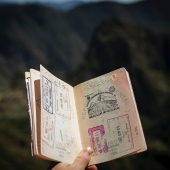Why not plan then simply enjoy your journey?
There is a perception that studying abroad will always be a big burden on your wallet. Without proper planning, this can sometimes be true, but if you organise your finances well enough, you can enjoy a successful study trip anywhere you please.
One key element of proper planning is devising a strong and realistic budget (as well as sticking to it while you’re away). Some of these things may seem obvious, but it’s good to have a list sometimes to make sure everything has been covered.
Likewise, a trip without proper budgetary planning can mean stress and fear. Any trip abroad, though especially educational ones, should be as enjoyable as possible; not filled with worry.
So first things first: you’re going to have to know how much your course will cost. And to know that, you’ll have to know which course you are going to take.
So start with researching your exchange options.
If you have multiple potential study destinations available to you, don’t just pick the city or country you most want to visit. Consider how affordable each place is. You can have a wonderful time in all sorts of places, it doesn’t necessarily have to be your first choice every time.
Every country will have a general average of how expensive accommodation and living expenses can be, but the average isn’t accurate for everywhere. If you want to stay in the United States, for example, New York and Los Angeles will be a lot higher than the national average, but if you find a place on the outskirts of a city, or a smaller place entirely, you can save a huge amount of money.
Accommodation too, can vary greatly, depending on whether you stay on campus, with other students, or with a host family. This will depend on personal preference, but can also have a great impact on your funds.
When deciding where to live, always think location. It may make sense to pay a slightly higher rent to be within walking distance of your school and to access campus programs and events more easily.
Depending on the cost of transit, a cheaper rent farther from school might also make sense. Another option is to purchase a used bike or join a bike-share program, which usually offer unlimited rides for a monthly fee.
Just by looking through these general costs, you can really get a feel of how much you will be spending in each place, and where your quality of life might be a little stronger.
Also, if you can’t stay for an entire year (or more), consider shortening your stay. Courses come in a wide variety of lengths, from just a few days, to months and longer.
Once you’ve got a good idea of which of your preferred destinations are affordable and pleasant, you can move onto your choice of school- particularly with regards to tuition.
Use your tuition as the primary building block for your budget. Don’t forget to read the fine print for your study abroad program, as you may be charged additional fees for being an international student. Tuition is likely to be your biggest expense, but don’t forget about supplies. Textbooks can get very expensive sometimes, so try and bear that in mind as you browse around.
So after all of that, you should have a general idea of how much in living expenses your trip will cost, accommodation and tuition. These costs will form the bulk of your study abroad expense. What you can now do, then, is calculate your ‘big picture’ number. So by calculating how much money you currently have access to and subtracting the general study abroad costs so far, you will get a reasonable idea of how much you need, or even have spare. With this information, you may have to continue looking for potential destinations, or you can forge onto the next stage.
Apply for every possible source of financial support.
This is an important one. There is so much help out there, it’s just about doing your research and applying for everything you can. There’s always a small chance you’ll receive financial aid, so it’s worth a try.
It’s all about applying on time, and applying for everything possible. This includes any bursaries or reimbursements available. You can get loans, flights paid for, lower tuition, all sorts of things. So, although filling out forms for financial help can be tedious and annoying, they are 100 percent worth it.
Consider, but don’t rely on work.
There are lots of little fees that can add up as you make your application, such as visa fees. It is around this time that you may begin to think about applying for work while you are away.
A job abroad is an excellent idea- it will look great on your resume and will help you make a little extra to put towards your travels. Some student visas will allow you to work for a set amount of hours each week, so make sure to read the fine print and figure out if that's an option for you.
Not to mention that it's a great way to really get to know your host country, practice your language skills, and meet friends.
However, you shouldn’t be reliant on the money earned from this as a way of funding your trip. As a little extra cash, it’s great, but if you will be using this money to pay for your tuition or accommodation, perhaps consider a cheaper destination. Jobs, especially while you are a student, can be fleeting and the stress that comes with being in a foreign country, studying and trying to hold on to a job all at once can sometimes be more trouble than it is worth.
Take into account any additional costs.
As mentioned, check how much the potential student visa costs may be and that your passport doesn’t need renewing soon.
The other big fees include flights (or however you travel to your destination), as well as other potential travel costs. Students abroad will often make use of their new home to do some extra travelling. If you were to stay in Paris, for example, London, Amsterdam, Rome, Dublin- pretty much all of Europe is a short flight away. If you plan on doing some extra sightseeing, take this into account. Just travel light and try and book in advance.
Similarly, you will need to know how much transportation costs in your day-to-day. Buses, trains and taxis- how far (and expensive) is it to get between work, school and home each day?
Food is another major expense. If you don't like to cook, a meal plan will prove more cost-effective than relying on takeout or restaurant meals. Also consider making friends with the locals to find the most cost-effective places to shop and get your food. Even if you plan on mainly cooking for yourself, you will want to allocate money for sampling local restaurants.
Other key expenses will be your mobile phone and possibly an internet connection. Check with your current carrier to determine whether its international plan will prove affordable over the long haul or if it makes more sense to find a local carrier. The last thing you want is to be hit with onerous data roaming charges.
Most universities will require you to have some form of health insurance, acquired either through their own service or an insurance company that offers compliant international student health insurance policies.
It’s best to always be proactive and have backup scenarios if finance problems or emergencies arise, so you will also want to set aside 10-15% of your overall budget for emergencies.
With stolen items, alert the police. With lost items, inform your travel insurance company. If you run out of money, arrange a way to have funds transferred. No matter what scenario, keeping your cool and staying flexible will allow you to walk away with minimal damage.
Use budgeting tools.
Okay, so there are lots to consider and keep track of. Making notes in a journal or in an Excel spreadsheet is a good start, but there are lots of good budgetary tools online to keep track of all your incomings and outgoings. Sites like Mint offer general templates and calculators to set up a monthly budget, for example.
It’s also important to consider currency conversion. Most people are surprised by the vast difference between currencies. Before you start making an expense list, take your “big picture” number and see what it converts to in the local currency. There are various currency converters online that allow you to do this with amazing accuracy, such as XE.
A student discount card is also available in many countries, which you should definitely make use of if you can. They offer discounts on various items, from museums tickets, to transportation, to dining. Lots of shops, both retail and online will also offer discounts with one, and so the sooner you get your hands on one and make use of it, the better.
Take the time to sort out your bank account.
If you’re going overseas for less than a year (and not working), it makes the most sense to keep your bank account and use it while abroad.
However, you don't want to waste money getting charged foreign transaction fees or ATM fees all the time. To avoid this, find a bank that doesn’t charge foreign transaction fees or reimburses you for ATM fees - major banks are your best bet.
You should also let your bank (and credit card companies) know you are travelling- there’s nothing worse than trying to pay for something and having it be declined.
Otherwise, if you choose to open an account in your new country, it can still be worth it as you won’t have to deal with these stresses. It’s free (typically), will only take half an hour in most cases and will reduce the amount of international fees you have to pay.
In a bind, ATMs are great but don’t use them on a daily basis since most foreign ATM's will charge transaction fees. Also, never use cash exchanges at airports, they're a rip off. Try leaving home with some money in the local currency so you're prepared for those initial expenses, like transportation from the airport.
Also, you may need cash for emergencies and to pay for travel visas -- which are almost always paid for in cash. Remember to carry only enough cash on you as you need while out and about, and lock up the rest in a safe place.
Have Fun but be Careful
Once you have all the necessities planned, that is when the real fun begins. As long as you stick to the budget you have made, you can figure out what you want to spend the rest on- your fun money.
Whether that be money spent on nights out, on food, souvenirs, shopping, travelling, whichever it is, as long as it is well-budgeted for, then do what you will- and enjoy it.
The temptation of course though, is it to spend the vast majority of your money on these sorts of things, but they really are that much more special when you know you can afford them, when all of your debts have been paid and you know you aren’t going to have to just eat rice for the next two months.
Traveling overseas is an incredible, eye-opening experience for students. It's a time to meet new people, see new places, maybe learn a new language, and then return, hopefully wiser and happier. By traveling smart, students ensure their time overseas is as fulfilling as possible.










